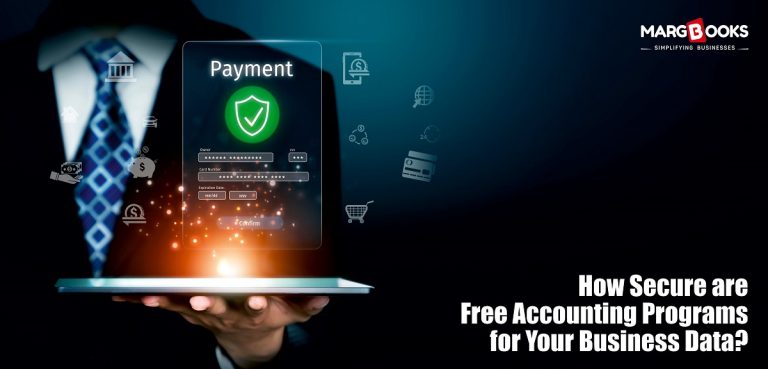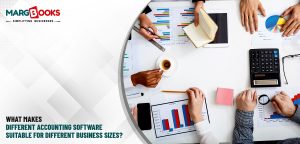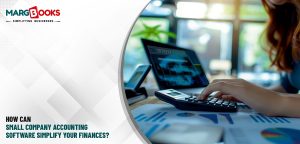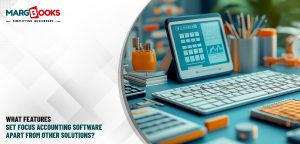In today’s digital age, businesses of all sizes are increasingly turning to online accounting solutions to streamline their financial operations. Free accounting programs have become an attractive option due to their zero-cost appeal and ease of use. However, as with any free tool, questions arise about the security and safety of the data stored in these programs. After all, your business data is valuable, and the last thing you want is to risk compromising it.
This blog delves into the security aspects of free accounting programs, evaluating how safe they are for your business’s sensitive information. We’ll also touch on the importance of using integrated online accounting software and online inventory management software for exhaustive business operations.
The Rise of Free Accounting Programs
Accounting software plays a crucial role in managing financial records, tracking transactions, and ensuring regulatory compliance. Traditional accounting methods, spreadsheets or manual ledger entries, are time-consuming and prone to human error. Enter free accounting programs, which promise businesses an easy-to-use, cost-effective solution.
These free programs are widely available, often offering basic features such as:
- Invoicing
- Expense tracking
- Financial reporting
- Bank reconciliation
Some free accounting tools even offer more advanced functionalities, including online inventory management software for small businesses to monitor stock levels and sales. This can be particularly helpful for businesses dealing with physical goods.
However, while these tools may appear to be a dream come true for small businesses, the question remains—how secure is your data in these free programs?
Understanding the Security Risks of Free Accounting Programs
When it comes to free accounting programs, the security of your data can be a double-edged sword. Here’s why:
- Limited Customer Support and Features
Free accounting software often comes with limited support and basic features. With no premium support available, users may struggle with timely troubleshooting, particularly in the event of a security breach or data loss. - Data Privacy Concerns
Free programs may not always adhere to the strictest data privacy standards. While some platforms are GDPR-compliant (especially those that are more well-established), others might not implement the best encryption practices, leaving your financial data exposed. - Potential for Data Mining
Some free software providers may use your data for marketing purposes or even share it with third parties. While this might not be an immediate threat to your business, it’s something you need to be aware of, especially when dealing with sensitive financial information. - Lack of Regular Security Updates
Free accounting programs might not receive frequent updates, particularly when compared to their premium counterparts. The absence of regular updates leaves software vulnerable to cyberattacks, ransomware, and phishing attempts.
Comparing Paid vs. Free Accounting Software Security
Let’s face it when you’re running a business, the last thing you want is a data breach that could compromise your financial records. Paid accounting software often offers more robust security features, which are:
- Advanced encryption protocols to protect sensitive data.
- Two-factor authentication (2FA) for added login security.
- Regular updates to address new vulnerabilities.
In contrast, free accounting programs may lack these essential features. That said, some free programs do offer basic security measures such as SSL encryption and regular backups; these features also come in online accounting software as well but these may not be sufficient for businesses with larger, more complex financial needs.
How to Increase the Security of Free Accounting Programs?
If you choose to use a free accounting program for your business, there are steps you can take to minimize potential security risks:
- Use Strong, Unique Passwords
Make sure to use strong and unique passwords for your accounting software accounts. Avoid using easily guessable passwords, “123456” or “password.” A password manager can help generate and store complex passwords. - Enable Two-Factor Authentication (2FA)
If available, enable two-factor authentication for your account. This adds an extra layer of protection by requiring a second form of identification (e.g., a code sent to your phone) in addition to your password. - Regular Backups
Set up regular backups for your accounting data to ensure that, even in the case of a breach or accidental deletion, you can recover your important files. - Be Wary of Integrations
Free accounting programs may integrate with other third-party applications. While integrations with tools like online inventory management software can help simplify operations, ensure that these external tools also follow stringent security practices. - Read Privacy Policies
Before opting for any free program, always check the provider’s privacy policy. Make sure that your data is not being sold or misused. Providers that operate transparently are less likely to compromise your data.
Why You Should Consider MargBooks for Your Business?
When it comes to managing your business’s financial records, MargBooks is an excellent example of a reliable and secure accounting tool for small to medium-sized enterprises (SMEs). Offering both free and paid plans, MargBooks provides a seamless user experience with complete features that cover:
- Accounting management
- GST compliance
- Inventory management through integrated online inventory management software
- Payroll management
MargBooks places a strong emphasis on data security, implementing strong encryption protocols and offering regular updates to keep your financial data safe. In addition, it ensures that businesses stay compliant with Indian tax laws, making it a solid choice for entrepreneurs looking to streamline their operations.
Is Free Accounting Software Right for Your Business?
While free accounting software can be a great entry point for small businesses and startups with limited budgets, the security risks should not be overlooked. If you are dealing with sensitive customer data, large volumes of financial transactions, or have strict compliance requirements, it may be worth investing in a paid solution. Free accounting programs are often suitable for basic tasks but may not offer the all-around security or advanced features that growing businesses need.
Conclusion: A Secure Financial Future
In conclusion, free accounting programs can be an effective solution for small businesses and freelancers who are just starting. However, business owners should always prioritize security when managing financial data. Ensure that you follow best practices, enabling 2FA, using strong passwords, and opting for software, MargBooks , which offers enhanced security and functionality tailored for your business needs.
Whether you’re looking for a simple invoicing solution or an online accounting software suite, make sure to choose a platform that balances cost with robust security measures. Your business’s financial data is too important to risk, so stay informed and make decisions that will protect your data in the long run.




